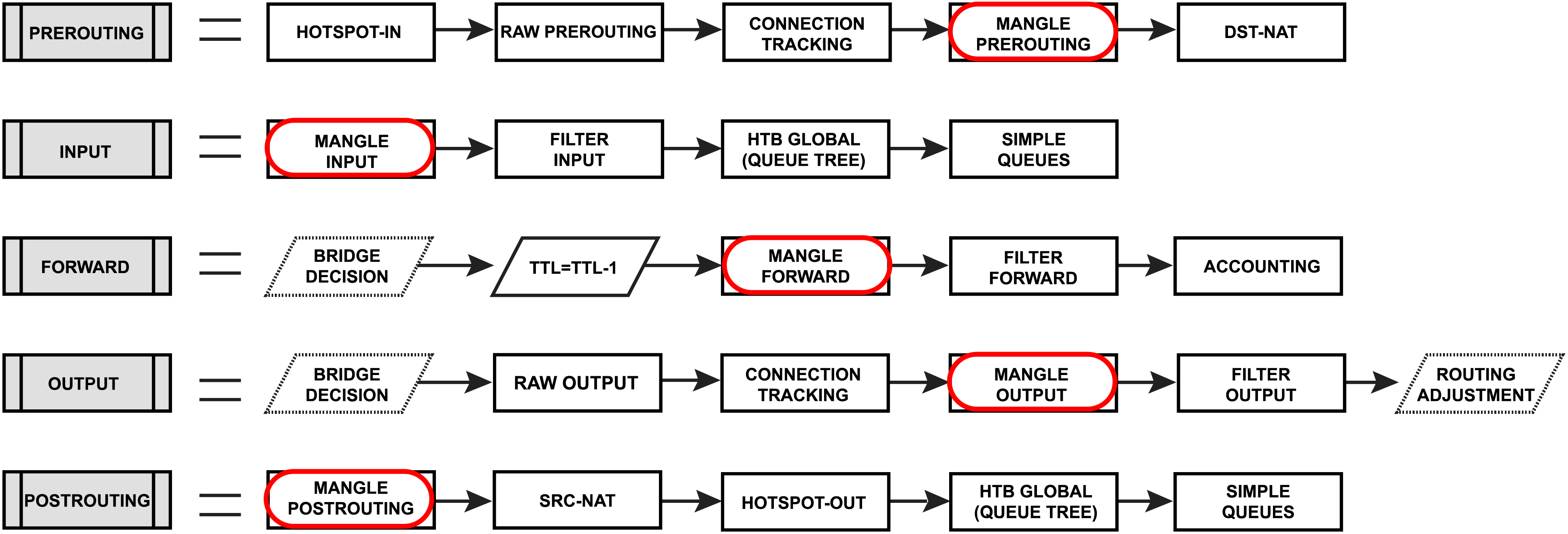Introduction
Mangle is a kind of 'marker' that marks packets for future processing with special marks. Many other facilities in RouterOS make use of these marks, e.g. queue trees, NAT, routing. They identify a packet based on its mark and process it accordingly. The mangle marks exist only within the router, they are not transmitted across the network.
Additionally, the mangle facility is used to modify some fields in the IP header, like TOS (DSCP) and TTL fields.
Firewall mangle rules consist of five predefined chains that cannot be deleted:
- The PREROUTING chain: Rules in this chain apply to packets as they just arrive on the network interface;
- The INPUT chain: Rules in this chain apply to packets just before they’re given to a local process;
- The OUTPUT chain: The rules here apply to packets just after they’ve been produced by a process;
- The FORWARD chain: The rules here apply to any packets that are routed through the current host;
- The POSTROUTING chain: The rules in this chain apply to packets as they just leave the network interface;
Configuration example
Change MSS
It is a known fact that VPN links have a smaller packet size due to encapsulation overhead. A large packet with MSS that exceeds the MSS of the VPN link should be fragmented before sending it via that kind of connection. However, if the packet has a Don't Fragment flag set, it cannot be fragmented and should be discarded. On links that have broken path MTU discovery (PMTUD), it may lead to a number of problems, including problems with FTP and HTTP data transfer and e-mail services.
In the case of a link with broken PMTUD, a decrease of the MSS of the packets coming through the VPN link resolves the problem. The following example demonstrates how to decrease the MSS value via mangle:
/ip firewall mangle add out-interface=pppoe-out protocol=tcp tcp-flags=syn action=change-mss new-mss=1300 chain=forward tcp-mss=1301-65535
Marking Connections
Sometimes it is necessary to perform some actions on the packets belonging to specific connection (for example, to mark packets from/to specific host for queues), but inspecting each packets IP header is quite expensive task. We can use connection marks to optimize the setup a bit.
/ip firewall mangle add chain=forward in-interface=local src-address=192.168.88.123 connection-state=new action=mark-connection new-connection-mark=client_conn add chain=forward connection-mark=client_conn action=mark-packet new-packet-mark=client_p
Warning: Packet marks are limited to a maximum of 4096 unique entries. Exceeding this limit will cause an error "bad new packet mark"
Mangle Actions
Table list mangle actions and associated properties. Other actions are listed here.
| Property | Description |
|---|---|
| action (action name; Default: accept) |
|
| new-dscp (integer: 0..63; Default: ) | Sets a new DSCP value for a packet |
| new-mss (integer; Default: ) | Sets a new MSS for a packet. Clamp-to-pmtu feature sets (DF) bit in the IP header to dynamically discover the PMTU of a path. Host sends all datagrams on that path with the DF bit set until receives ICMP Destination Unreachable messages with a code meaning "fragmentation needed and DF set". Upon receipt of such a message, the source host reduces its assumed PMTU for the path. |
| new-packet-mark (string; Default: ) | Sets a new packet-mark value |
| new-priority (integer | from-dscp | from-dscp-high-3-bits | from-ingress; Default: ) | Sets a new priority for a packet. This can be the VLAN, WMM, DSCP or MPLS EXP priority Read more. This property can also be used to set an internal priority. |
| new-routing-mark (string; Default: ) | Sets a new routing-mark value (in RouterOS v7 routing mark must be created before as a new Routing table) |
| new-ttl (decrement | increment | set:integer; Default: ) | Sets a new Time to live value |
| route-dst (IP, Default:) | Matches packets with a specific gateway |
| passthrough (yes | no; Default: yes) | Whether passthrough is enabled for the rule |
